This may sound hokey or whatever, but living abroad is making me really good at hokey. The element of living in Guatemala that I most appreciate is the consistent learning. Sometimes I don't appreciate so much being humbled by the complexities that I don't understand of any given issue, but I feel that over the last year I've simply absorbed so much perspective about the worldview, assumptions, cultural mythologies, and experiential knowledge that color Guatemalan perspective.
I live with the assumption that a given child has some kind of intestinal parasite, at least one parent living in "El Norte" and a (very basic) education based in a language he does not speak natively. I assume all children have 'retardo de crecimiento' or stunted growth due to malnutrition and that their parents don't understand that potatoes and corn are carbohydrates and not vegetables. I make these assumptions in all cases until proven otherwise.
I assume that all of you understand what a clean cook stove is, what I mean when I say I'll be giving a charla to comadronas, and the complexities of family planning and alocholism in a machista culture experiencing extreme poverty. And all these assumptions are based on the normalization I'm experiencing here as I see more perspective-twisting norms every day.
And certainly Guatemala is not struggling with the same problems as certain war-stricken or drought-riddled African nations, but the daily struggles of the people here affect their decision-making and cost-benefit analysis. Even my own behavior and habits have changed dramatically with the society I'm living in.
A few examples: when I was living in the aldea of my community, there was no market. I'm talking not just no grocery store, no place to buy a single fruit or vegetable even in the open air. You could sometimes buy tomatoes off the families that owned corner stores, but for the most part if you ran out of onions, carrots, or anything else you were SOL until the market came to the nearest town on Saturday.
And I also didn't have a fridge--just like most of the rest of my community.
So what did this mean practically for me? It meant I never bought green leafy vegetables. They're sold in quantities for families and in the humid climate here they don't last more than 2-3 days out of the fridge. And halfway through the week when I ran out of veggies, I either waited an hour for the bus and traveled an hour and a half to Xela, or I just waited until Saturday. Which means I waited until Saturday. And past it was or the rest of the week.
Moving to the pueblo that has a market and better transportation, I lost ten pounds within two months of the fifteen I'd gained here. Not sure how I'm doing on that but still! That just with access to produce more frequently.
Another example: getting to work on time. I'm great at being on time. I operate on the early is on time, on time is late, and late is unacceptable mentality. But here, it doesn't make any sense whatsoever. I make the early camioneta just to sit for 20 minutes and wait for the puesto to open. Or I get on a micro 40 minutes later and when I get there the puesto is (usually) open. And it bothers no one that I'm 20 minutes late.
Or running. In the States the mentality is "haven't run in 3 days better get a workout in" here it's "oh! I'm finally not pooping and the shower facet is working properly and there's water! Better run this morning before it rains at 2 or I might not get another chance like this for a month!"
I guess I'm also commenting on the difficulty of behavior change given limited resources. Look at me. I understand nutrition--maybe not well enough to be a licensed nutritionist, but well enough. And I have a culture and habit of eating a diet based mostly in fresh vegetables, yet I still spent my Fridays eating cheese puffs and white sweetbread.
Imagine in the situation where most don't even know that sweet white bread isn't healthy just because it's made from what they understand as "natural" ingredients. Imagine changing from eating 2-3 or 4-6 of these white panes every day on top of the tortillas, white rice, and pasta to more veggies when you have to travel 45 minutes to buy veggies, they're only available 2 days a week, and they go bad a whole lot quicker than pan or corn meal. And you really don't have the quetzales to waste on spoiled food, seeing as your trying to make 80Q (about $10) provide for your whole family. Of 10.
Yeah.
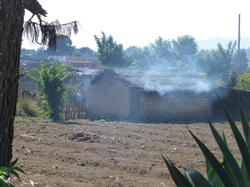 So I showed one of my best friends last night the link to the new PC Guatemala website. His response was something to the effect of "oh, you work in women's health now?" This made me realize that a lot of you probably don't know what I'm doing down here. So, first of all, check out that link.
Second, listen up :). I'm here to help fortify the Ministry of Health from the inside out. We're trying to work together with the existing staff to create better trainings for new staff and to implement better health talks for community members. We're working to create better organization at the community level (Comisiones de Salud) and to get information out to mothers that will help them lead healthier lives. We train midwives to deliver babies more safely and more hygienically.
Which leads me to both the picture above and the youtube video below. The picture is a house in one of my communities. Looks like its on fire. That's how much smoke is coming out of the kitchen. Many women in rural Guatemala still cook on open fires inside the home, exposing themselves and their children to an equivalent amount of carcinogens as about two packs of cigarettes every day. I don't directly work on clean cook stoves (estufas mejoradas) but I have had the opportunity to collaborate a little bit with my site mate who's doing an evaluation of previous projects.
The video below has a lot to say about the importance of family planning in developing countries. You may not agree with what it has to say, but at least watch it. I'll decompress the complexities of family planning here in Guatemala next time if you're interested, but this video has a lot to do with the problems I see every day here--whether poverty from numerous families, maternal death, or machismo seen through denying of the woman's access to birth control.
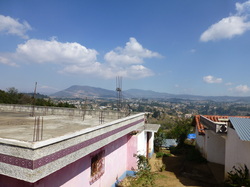 That's where I work. Sometimes it's above the clouds. Beautiful.
Sometimes I think 'I live in Guatemala' and just let myself reflect on that strange, sentimental knowledge. And even then it sounds as profound to me as it does to you. Not at all.
I've been here for enough time to grow another human being inside my body, and I'm not always sure what I have to show for it. And I think again and realize that in a culture that's so based in production and efficiency (the US of A), we sometimes forget the most essential parts of progress.
I've noticed that the volunteers that are the smartest, most outgoing, and best at Spanish aren't always the most effective and efficient volunteers.
One of my best friends came to Guatemala with the lowest level of Spanish in our entire training group. At first I thought she was shy, but she's really a ball of fire. Chatty as hell and quick as a whip. She is one of the most observant, empathetic, courageous people I know in this country. Sometimes she rags on herself like we all do about thinking we haven't accomplished enough. But this girl has developed stronger friendships with her host family, her host country national counterparts, and other volunteers than anyone. She is my rock and enables me to stay here even when I want to jump off a cliff because I haven't been able to cook in my house for the last week because of a gas leak. Her service is already a successful one because she is able to accomplish so much with the insane humanity she brings to her work and her life here.
As for me, I think I've already become more humble, less of a know-it-all, more organized and a better team player. Not to mention more observant of other people's feelings, more patient, more generous, and more forgiving. All of these small accomplishments make me extremely proud. Coming to Peace Corps I didn't know what a reasonable goal would be in terms of quantifiable accomplishments in my service (and to a certain extent I still don't), but I did know that I wanted to grow up a little and be a much stronger, more resilient, more patient version of myself when I returned.
I also think I underestimated the importance of understanding learning as accomplishment. The country director visited my site last week, and realized how much I still have left to learn about Guatemala and the complexity of global development problems. But at the same time, I also realized that I understand some elements of life in rural Guatemala that even he had not yet discovered.
We each so intimately know the one piece of land we're given to serve with all its beauty and flaws. We're the only foreign development professionals who know which community leader to talk with about a wastewater drain project and which mayor would be most likely to round up the others to collaborate in the coordination of a local health commission.
Of course, ultimately, the intimate elements of life here in Guatemala are known best to the people who grew up in the aldea of San Whatever with only 2067 people, but as a Peace Corps Volunteer here, I'm learning when, how and whom to ask and more importantly how to listen--not just to what someone says, but also to what they don't want to say, what they'll refuse to do, and what their unspoken concerns are.
I've been having a hard week with Peace Corps. Mostly because the rules that limit our mobility within the country have made me feel limited in terms of the Guatemalan friends I can make and hold close. But at the same time, I'm in the best place I've been emotionally with my work, my fellow PCVs, my Guatemalan coworkers, and this lovely, dusty, green country that I'm lucky to call home for the next few years.
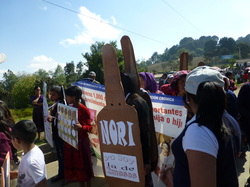 I'm a terrible, horrible, no good, very bad blogger. But at least the days here have been great. While it's been warming up there, it's certainly been warming up here too. HOtttt!!! But that strange mountain air that burns your face off in the sun but makes you want to cuddle up under a blanket in the shade. We're at something like 8,000 feet, so I guess it's understandable.
Things are rolling amazingly here. We're getting started on some things that I have great hopes for. Those are a secret for now, but I'll let you know when they get a-movin.
We're also using one elementary school as a pilot school for better malnutrition support in our district. So far, we've weighed and measured all the kids. With the parents of all the underweight kids, we're going to give them a series of workshops about what malnutrition is and how to avoid it. Then we're going to give each family seeds for a vegetable garden and help them plant it. At the end of the program, of course, we'll weigh the kids again and see if they've gained weight.
I'm also hoping to paint some murals and get some other stuff going in my community. This month will hopefully be our community's first Health Commission meeting. This is an initiative to help the most rural and underserved communities advocate to their needs to their municipal government. It's an amazing tool that should be implemented nationwide, but many of the rural community leaders don't even know that such commissions exist. I'm sure there will be many struggles along the way of getting this started--people in local leadership positions already donate so much time, so I'm sure this will take a while to get started and to get momentum behind it. It may not work at all, but I value this initiative tremendously and plan to put my full weight behind it. But wish me luck!
Also, I'm sure you can tell from the picture, but we just had feria in one of my aldeas and that was the parade, with community members marching dressed as family planning methods. Far too amazing. I dressed in traje for the first time (Picture below).
Everything's going really smoothly, and I can't wait to get these projects moving. I've loved having site mates and being able to collaborate with other PCVs with similar project goals. We're supposed to be getting another PCV in our community later this month once the new volunteers swear in, and I could not be more excited for the collaboration opportunities that this new volunteer will present.
We're working together with Maternal and Child Health volunteers from other communities to collect, inventory, and analyze the resources currently available for midwives' trainings and for community-based organization trainings as well. This could be a two-to-six year process---getting all the materials together, assessing what materials are needed, and creating new materials for distribution to all health centers and posts. Regardless of that, this could be one of the most worthwhile initiatives coming from the MCH project if our goal is to improve trainings given to community members with the objective of reducing maternal death. Not so glamorous a job maybe, but definitely a worthwhile one.
Sorry this is becoming less of an analysis and more of a diary. I'll get some thoughts on a page soon and share them with you all!!
I had my first visitor last week. It was amazing. Pics and stories to come.
But not now. Because the internet's not working. Not really.
And the stove won't light so I haven't been able to cook anything.
Also the lights went out yesterday. And there's been no water for the last 48 hours. Which means I can't wash dishes or clothing. Or my body. When the water finally came back, the water heater wasn't working. So it was a dripping cold shower for me this morning.
And I'm feeling pretty whiny about it.
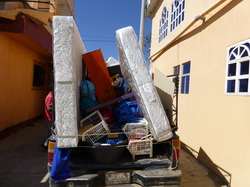 This is what it's like to move in Guatemala. I wanted to work in another aldea that had more work opportunities, so I had to pack up all my stuff again (5th time since May)and unload it in a completely new house with a completely new family.
Turns out I love the family. Really lively and lots of energy. Not around a ton, so I have plenty of personal space, but we share a kitchen so I also have the opportunity to spend quality time with the family when they are around. Another PCV might be moving into the sister's house in a few months, in fact. Woohoo.
It is a little weird to live in the municipal head now, though. It's definitely a much wealthier community with more resources and opportunities. Every child in this family is currently attending school. We have a TV, a refrigerator, and a microwave. I can even get ESPN.
I'm really looking forward to getting to know my site mates better and to having the opportunity to collaborate with them on projects that fit both our goals. One of them (who's amazing just generally) is going to be helping us with a nutrition workshop we're giving for all of the health center staff at the end of next week. Stay tuned, it should be good!
Guys, I've been in Guatemala for 7.5 months. PC has this really silly "life cycle of a Volunteer" infographic which says that I should be reaching right about now a low point in my service. I should be feeling like I haven't accomplished anything yet and should be feeling lost and not knowing what to do next. Ding, ding, ding! Winner, winner chicken dinner. I know I'm not the only one who feels this way. Sometimes I just sit and wonder what *are* reasonable goals for me in my service and what I *should* try to do here. It's part of our behavior change model that you have to "precontemptlate" and "contemplate" before you can make any change. Yep, definitely in that phase personally. Can't. Don't. What is goalsetting? I think part of the issue is that we as PCVs are natural go-getters, overachievers, seekers. So we're our own hardest critics. I haven't done *nothing,* even though it sometimes feels that way. I've helped a bunch of women write emergency action plans for their pregnancies. I've taught 75 women about basic family nutrition. I've made connections with people who I can work with on future projects. We had that girl's camp. I've coordinated (for next month) a training activity for all the health district personnel. And I've learned a boatload. Things I've learned so far: *The legacy of NGO presence and political support rallying (read: manipulation) by the government has left the legacy of a handout culture in many communities where it is impossible to motivate people to attend trainings without receiving some kind of tangible benefit. *Food security here isn't always an access or an education issue. Sometimes people have the money, local availability, etc. to put good food on their table and choose to eat rice with a side of tortillas. Maybe they still legitimately don't understand the importance of protein, vitamins and minerals. I think that for some it's harder to change the recipes that have been in their family for generations to include more veggies. *Alcoholism is a problem. I don't know if I've written about this yet, but I've intended to. The other day there was still frost on the ground when I left for work. While walking there, I saw a young man (18 maybe if I had to guess) lying on the ground on his back in a drunken stupor, wearing a t-shirt and slacks. No jacket. No hat. No scarf. Just lying there in the shade beneath the building. People come to the health post so drunk they can hardly speak. There's a PC legend that a man in one of the communities we work in died on the street and wasn't discovered for 2 days. Here, people pass out drunk on the side of the road all the time. So, nobody disturbs them. 2 days is a scary thought, though. *The education system here, phewy! They took science out of the tercero basico curriculum (equivalently about 8th grade) in public schools. Three days into classes, the teachers in the entire country went on strike. There are no classes right now. I'm not even sure if I can get to work today, seeing as they're blocking the roads in my municipality. *God, Guatemala's complicated. We think about the lack of development here, and my first reaction is to blame the civil war/genocide (whatever you want to believe) for crippling the economy, trust in the government, and basic access for rural Mayans. But I don't know anymore. Sometimes I think other factors are bigger than that, but I'm not sure where they come from... - Reliance on religion to a crippling extent. Now, I'm not that religious but religion is a huge strength for so many people I know. Here, it sometimes prevents people from making proactive health decisions. I can't tell you the number of times I've heard "If God wants me to live, I'll live. If he wan'ts me to die, I'll die in the hospital anyway, so I'm going to stay at home and see what he has in store for me." I desperately appreciate the value of individual choice and individual values and respect these decisions, but they scare me. I'm afraid for the women that make these choices.
- Machismo. I don't know where this comes from in Mayan values, but I do know lack of access to birth control (many times at the husband's decision) makes so many women here vulnerable to poverty, hunger, and death.
- Corruption. Yeah, I know where this one comes from.
My poli-sci professors would be so mad at me for identifying 2 cultural factors as contributing factors to lack of developmental progress. (I'll define development at some point.) But anyway, so my life right now is a strange mixture of adventure and work. I need to go into hibernation for a few weeks and just reflect on everything I've learned so far. It's a crazy, crazy world. TLDR? Read it.
This might come off as a really silly entry. But I want no criticism. It's just been something that I've been feeling a lot lately, and I just want to throw it out into the world.
So. I'm sick and tired of praise for how selfless Peace Corps is. Not really, I revel in it, but that's not the point of this entry.
The point is, I really don't think it's that selfless.
I left everyone I love and everyone who cares about me and expected them to keep in touch with me and to still love and care about me when I get back. I expect them to write letters and to call me, to spend money sending me packages. I expect them to listen to me cry to them when I feel homesick, whenever I feel homesick.
I expect people to spend hundreds of dollars and their vacation time to visit me.
I expect my parents to still support me financially. My parents brought me so many clothes and so much food for Christmas. To be honest, the only thing that they brought that I didn't ask for was the one that touched me the most. They bought a SmartWool sweater and some leggings 'so I wouldn't be cold'. Weep.
And what's worse. I left my poor parents alone at Thanksgiving when it was the first for both of them without their parents. And they let me do it without complaint.
My friend drove a hard drive across town to my parents house, they brought it to Spain, and I LEFT IT on my sister's counter. It's now in the mail to Guatemala, making her the 4th person who had to spend time, energy and money getting the damned thing to me. I just depend on so many people, and then those same people praise me for my independence and goodwill.
Well, stop it all of you! It's my turn to say thank you and that you're the truly selfless ones who let me just uproot myself for two years. My poor mother answered a waiter once with tears in her eyes 'you have to let them do what makes them happy' in response to his asking how she felt about me leaving for Peace Corps. She's never once felt betrayed that I just left her and my dad alone, as empty-nesters just to go have an adventure by myself.
I've stopped thinking that the volunteers, the adventurers, are the selfless ones. I think it's the support system we leave behind who all miss us but are always there for us that are truly the selfless ones.
Sorry I'm sappy. But I mean it, you. (Grandma McCalley finger for good measure).
So. First of all, I just got back from Spain, which was great and amazing and you can read all of my feelings perfectly captured here. I don't really want to go too far into my trip to Spain right now becuase it feels slightly out of place on a Peace Corps blog and because I'm so terribly homesick after seeing my family that I'm afraid that if I start to write about it, I'll start crying obnoxiously in the internet cafe. So to avoid that at all costs... see my facebook for photos of the trip, and we'll talk soon. So, I was walking around my community today and I had a realization. After the realization I thought to myself 'Wow, Rebecca! That is dumb that it took you six months to realize.' But here it is. So dirt here is dirtier. We've known this since we arrived. People get sick so much easier and so much sicker when they do get sick--well, actually, it's mostly because people don't wash their hands, but that's not the point I'm trying to make.... We've been afraid since the beginning that all the dirt is actually poop. I'm afraid not to wear shoes in my house, and I've become kind of anal about my floors. Which my mom and all of my former roommates will say was not previously in my character. And it turns out, we were kind of right. At least in the rural areas. I kind of knew that there were no drains in my community. You see soapy water dribbling down from a house and you realize that the drain from their pila goes to nowhere. But I just had my insightful realization the other day when I was talking to a very intrepid young man who is soliciting funding from the municpal government for a community drain. There are no drains for any pipes in the community. That means rain washes wastewater into the roads of the community. It's no wonder that I just have this icky feeling every time I step onto my floor in socks, no matter how recently I've washed it. Gross story for the week seems to be a trend for my blog.
Yeah. Yeah! It's getting ready to be Christmas in Guatemala. I mean of course it's weird because there's no snow and there hasn't been, so it doesn't really feel quite like Christmas yet, BUT. but. I'm already packed for Spain (since Sunday, no shame), so you know it's about to be Christmas for real. Christmas is very different here, culturally. Of course there's ads and things announcing it's Christmas season, and there are sales. But the sales are principally on things like appliances. Traditional Christmas giving here doesn't really exist. The tradition is to give the abrazo de Navidad (the Christmas hug) at midnight on the 24th. Families celebrate by eating paches, mashed potatoes with lard and a small piece of pork to give them flavor covered in a sauce of tomato, pumpkin seed, and chiles, all wrapped in the leaves from a banana tree and steamed. And of course, despite the fact that they're principally potato, they're served with white bread on the side. Mmmmmm. In the Puesto, we spent basically a whole week making Christmas decorations for our feria de salud nutricional, where the women from the community with children under two came to play games, get prizes, and weigh and measure their children. (Pictures to come. Probably tomorrow. I promise this time.) I, of course, taught everyone how to make paper snowflakes---which they all thought were flowers and wondered why they weren't made from colored paper, but nevermind.... It's weird too because there are Christmas songs on the radio--both in Spanish and English--but not many. And a lot of the ones that do come on are parts of advertisements. With such a very religiously Christian nation, I was expecting more emphasis on Navidad (there is some, but a lot of it occurs in husbands drinking their wages). And here, you can say Merry Christmas before the mero dia, but only if you're not going to see the person until Christmas. The season is much more the day of and after. I'm going to spend the day tomorrow writing some blog entries I've been meaning to write for a while and sending in some photos, so stay tuned.
|



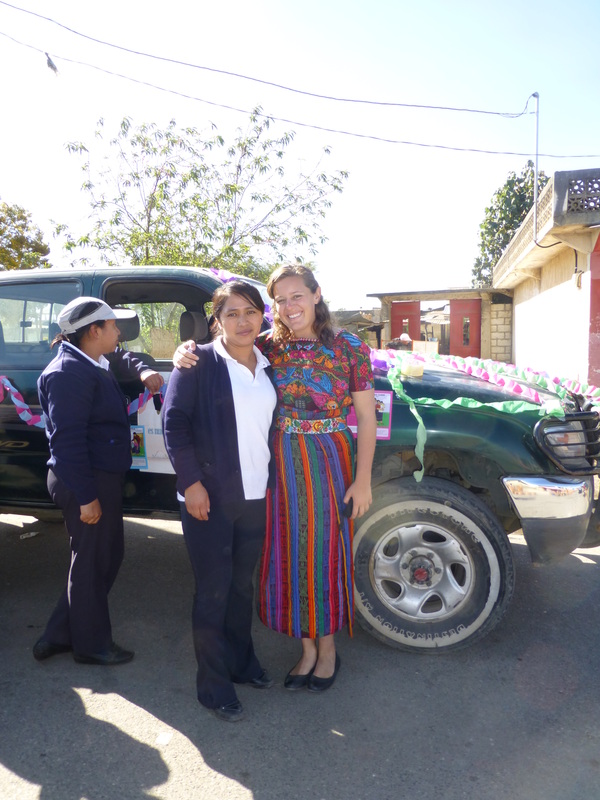

 RSS Feed
RSS Feed